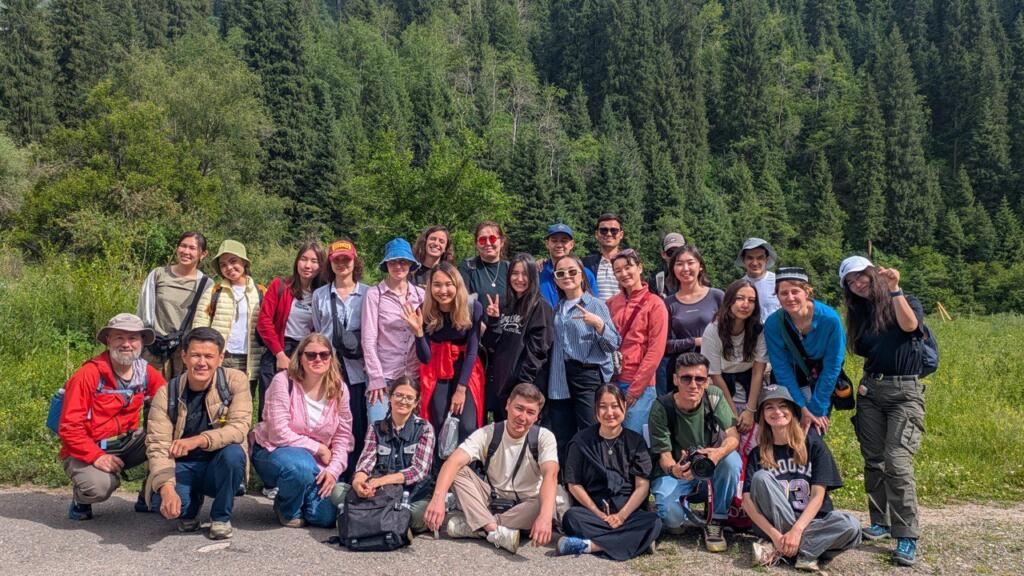

The first part of the school focused on hard skills – Digital Storytelling and Data Visualization. Trainers Azat Ruziev, Central Asia Fossil Fuels Campaign Leader at Bankwatch and co-founder of Bashta, and Aizada Toma, Program Mentor and Regional Editor of the Data Communication Fellowship Program Forset, led hands-on workshops that provided not only foundational knowledge but also immediate opportunities for participants to apply their skills in practice.
The school was conducted in English, reflecting the project’s broader effort to build the language capacity of journalists and communicators for future international cooperation. One full day was dedicated to English Writing Skills, led by Paul Hockenos, writer, editor, and media trainer.
As with every offline activity in this program, the school included a field trip—an essential component aimed at helping journalists understand national climate narratives firsthand. This time, the group visited the Left Talgar Pass: Water, Landscape, in collaboration with the Artcom Platform initiative. Participants learned about the impacts of glacier melt, biodiversity loss, and the Kazakh government's response—or lack thereof—to these issues. The trip also included a reflective mental mapping practice to deepen the participants' connection to nature.
Thanks to the support of JournalismFund, the school was joined by three EU-based journalists working on investigative climate and community-focused reporting:
We are especially glad to continue our collaboration with JournalismFund, whose support made the participation of EU-based investigative journalists possible. This is the second cooperation between n-ost and JournalismFund, and we highly appreciate their dedication to strengthening climate journalism. We hope that soon even more participants of our project will produce impactful investigative stories.
Recognizing the region's lack of cross-border journalism, the school also featured a dedicated workshop on creating transboundary stories. As a result, participants are now submitting joint project pitches.
On the final day, the program introduced a Non-conference format, inviting participants to take the stage themselves. Topics ranged from landscape in Turkmenistan and the communEECCAtors network, to climate finance and projects led by journalists.
Following the post-training survey, more than 70% of participants reported feeling confident or very confident in: creating basic data visualizations, using at least one digital storytelling tool, writing a climate-related feature story, identifying investigative story angles in local issues, reporting ethically on sensitive topics and reaching out to collaborators in other countries
This school marks another milestone in building a stronger, more interconnected climate journalism community across Central Asia and beyond.
I enjoyed every lecture! Even in topics that I thought I am good, I had new valuable insights. I also value meeting fellow journalists from other CA countries.
Participant of Summer School
All of the sessions were great, and really focused on meeting our needs and gaps. Data journalism, writing and punctuation tips, visual storytelling were great blocks of this week. I am grateful that you used our articles to discuss during the writing session and in general had a lot local, Central Asian examples during all of the sessions. I also really liked the last day of the conference as it was great to get to know other peoples projects and hopefully collaborate in the future.
Participant of Summer School
I really liked the hotel, the atmosphere and the teachers. There is everything you want, a lot of things, I want to say thank you to this project.
Participant of Summer School
I enjoyed session by Anna Jackova. It get a clear understanding of our practical problems that we are facing in our work with communities, and knowing about experiences of others participants gives confident to continue working with vulnerable community and writing their stories. The last day of summer school, which we reached out more about other countries, and more opportunities for journalists, it is very important to us, knowing that in our chosen way we have supports
Participant of Summer School